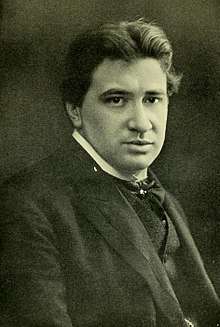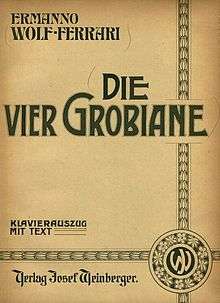I quatro rusteghi
I quatro rusteghi (The Four Curmudgeons, The Four Ruffians, in Edward J. Dent's translation School for Fathers) is a comic opera in three acts, music by Ermanno Wolf-Ferrari to a libretto by Luigi Sugana and Giuseppe Pizzolato based on Carlo Goldoni's 18th-century play I rusteghi. The opera is written in Venetian dialect, hence "quatro" instead of "quattro".
| I quatro rusteghi | |
|---|---|
| Comic opera by Ermanno Wolf-Ferrari | |
 The composer in 1906 | |
| Translation | The Four Curmudgeons |
| Librettist |
|
| Language | Italian (Venetian dialect) |
| Based on | I rusteghi by Carlo Goldoni |
| Premiere | |
Performance history

The opera was first performed as Die vier Grobiane in German at the Hoftheater in Munich on 19 March 1906. Its first performance in Italian was on 2 June 1914 at the Teatro Lirico in Milan under Ettore Panizza. The work was first performed in the United States by the New York City Opera on 19 October 1951 with Laszlo Halasz conducting. Wolf-Ferrari's most successful full-length work, it is still regularly performed.
Roles
| Role | Voice type | Premiere cast, 19 March 1906[1] (Conductor: Felix Mottl) |
|---|---|---|
| Lunardo | bass | Georg Sieglitz |
| Margarita | mezzo-soprano | Margarethe Preuse-Matzenauer |
| Lucietta | soprano | Ella Tordek |
| Simone | bass | Paul Bender |
| Marina | soprano | Gehrer |
| Maurizio | bass | Josef Geis |
| Filiperto | tenor | Hans Koppe |
| Cancion | bass | Alfred Bauerberger |
| Felice | soprano | Hermine Bosetti |
| Riccardo | tenor | Raoul Walter |
Synopsis
The action takes place in 18th century Venice.
Four curmudgeonly husbands vainly attempt to keep their women in order. The women decide to teach their menfolk a lesson by allowing Lunardo's daughter Lucieta to see Filipeto, the son of Maurizio, before their pre-arranged marriage, even though the men have forbidden this.
References
Notes
- Casaglia, Gherardo (2005)."Die vier Grobiane, 19 March 1906". L'Almanacco di Gherardo Casaglia (in Italian).
Sources
- Anderson, James, The Complete Dictionary of Opera & Operetta Wings Books, 1993 ISBN 0-517-09156-9
External links

- I quatro rusteghi: Scores at the International Music Score Library Project (IMSLP)
- Die vier Grobiane libretto (in German)
- I quatro rusteghi libretto (in Italian)